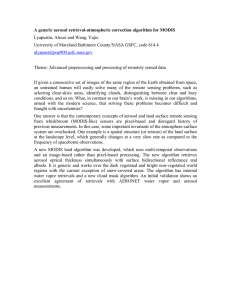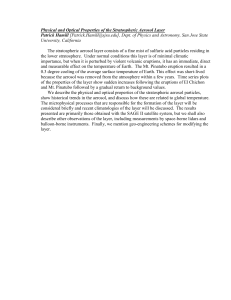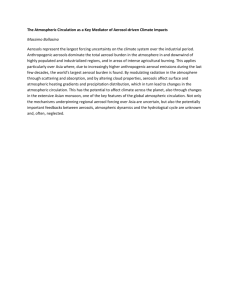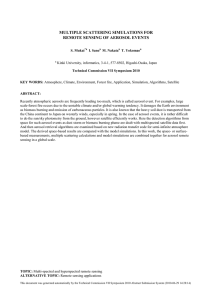Winter School on
advertisement
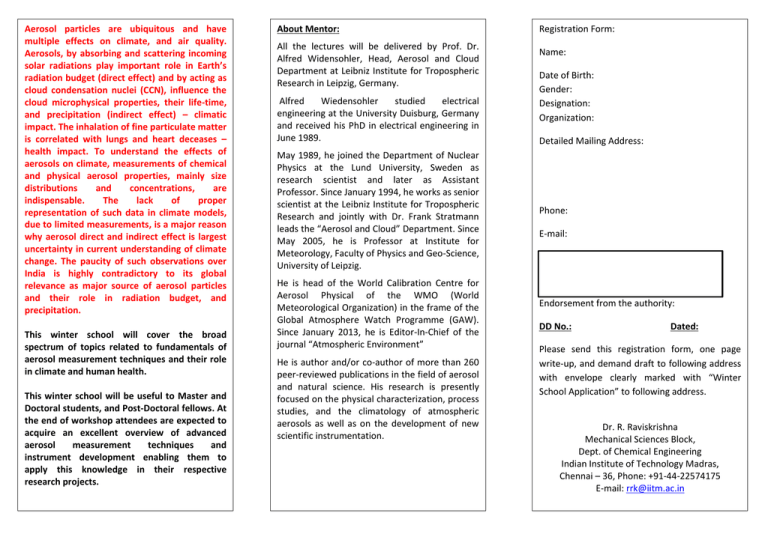
Aerosol particles are ubiquitous and have multiple effects on climate, and air quality. Aerosols, by absorbing and scattering incoming solar radiations play important role in Earth’s radiation budget (direct effect) and by acting as cloud condensation nuclei (CCN), influence the cloud microphysical properties, their life-time, and precipitation (indirect effect) – climatic impact. The inhalation of fine particulate matter is correlated with lungs and heart deceases – health impact. To understand the effects of aerosols on climate, measurements of chemical and physical aerosol properties, mainly size distributions and concentrations, are indispensable. The lack of proper representation of such data in climate models, due to limited measurements, is a major reason why aerosol direct and indirect effect is largest uncertainty in current understanding of climate change. The paucity of such observations over India is highly contradictory to its global relevance as major source of aerosol particles and their role in radiation budget, and precipitation. This winter school will cover the broad spectrum of topics related to fundamentals of aerosol measurement techniques and their role in climate and human health. This winter school will be useful to Master and Doctoral students, and Post-Doctoral fellows. At the end of workshop attendees are expected to acquire an excellent overview of advanced aerosol measurement techniques and instrument development enabling them to apply this knowledge in their respective research projects. About Mentor: All the lectures will be delivered by Prof. Dr. Alfred Widensohler, Head, Aerosol and Cloud Department at Leibniz Institute for Tropospheric Research in Leipzig, Germany. Alfred Wiedensohler studied electrical engineering at the University Duisburg, Germany and received his PhD in electrical engineering in June 1989. May 1989, he joined the Department of Nuclear Physics at the Lund University, Sweden as research scientist and later as Assistant Professor. Since January 1994, he works as senior scientist at the Leibniz Institute for Tropospheric Research and jointly with Dr. Frank Stratmann leads the “Aerosol and Cloud” Department. Since May 2005, he is Professor at Institute for Meteorology, Faculty of Physics and Geo-Science, University of Leipzig. He is head of the World Calibration Centre for Aerosol Physical of the WMO (World Meteorological Organization) in the frame of the Global Atmosphere Watch Programme (GAW). Since January 2013, he is Editor-In-Chief of the journal “Atmospheric Environment” He is author and/or co-author of more than 260 peer-reviewed publications in the field of aerosol and natural science. His research is presently focused on the physical characterization, process studies, and the climatology of atmospheric aerosols as well as on the development of new scientific instrumentation. Registration Form: Name: Date of Birth: Gender: Designation: Organization: Detailed Mailing Address: Phone: E-mail: Endorsement from the authority: DD No.: Dated: Please send this registration form, one page write-up, and demand draft to following address with envelope clearly marked with “Winter School Application” to following address. Dr. R. Raviskrishna Mechanical Sciences Block, Dept. of Chemical Engineering Indian Institute of Technology Madras, Chennai – 36, Phone: +91-44-22574175 E-mail: rrk@iitm.ac.in Topics to be covered: How to Apply: 1. Relevance of the Atmospheric Aerosols Please fill in the form given in this brochure forwarded (duly signed and stamped) by guide or head of the department or head of the institution. Also enclose short write up about your current research and “How do you think this winter school will help you?” Write up should not exceed more than one A4 page. 2. Introduction to Aerosol Physics and Chemistry 3. Mechanical Properties of Aerosols 4. Definition of Particle Size 5. Aerosol Charging 6. Electrical Mobility of Aerosol Particles 7. Condensation Particle Counters 8. Inlets, Sampling and Drying Designs 9. Differential Mobility Analyzer 10. Mobility Particle Size Spectrometer 13. Absorption Photometer In addition some interactive tutorials and demonstration of the instruments will be conducted. Formal enquires could be directed to Dr. Sachin S. Gunthe, IIT Madras at s.gunthe@iitm.ac.in Co-ordinators: Dr. Sachin S Gunthe, Dept. of Civil Engineering and Dr. R. Ravikrishna Dept. of Chemical Engineering, IIT Madras, Chennai – 36 “Atmospheric Aerosol Physics, Measurements, and Sampling Techniques” 13th – 16th January 2014 Indian Institute of Technology Madras Chennai-36, India Financial Support: Travel: Organizers will provide to and fro III AC return ticket from your workplace on production of original ticket. Accommodation and food: Organizers will provide free accommodation on sharing basis in the institute hostel for the duration of winter school (and one day prior and post winter school). Breakfast and lunch will be covered by the organizers. Participants are requested to make their own arrangements for dinner. 11. Aerodynamic Particle Size Spectrometer 12. Integrating Nephelometer Winter School on Caution Deposit: The number of participants is restricted to 20 of students. To avoid the loss to potential candidates due to last minute cancellation a caution deposit of Rs. 2000 (Rs. Two Thousand Only) need to be send with your application form as a Demand Draft of a nationalised bank drawn in favour of The Registrar, IIT Madras, Chennai payable at Chennai. Caution Deposit DD will be refunded at up on your arrive during winter school. Incomplete application without caution deposit will be rejected and no correspondence will be entertained. Last date for the submission of duly completed application is 20.Nov.2013. Organized by Department of Civil Engineering and Department of Chemical Engineering Indian Institute of Technology Madras Chennai – 36, India In association with Leibniz Institute for Tropospheric Research Leipzig, Germany Sponsors Centre for Continuing Education (CCE) Indian Institute of Technology Madras Chennai – 36, India
